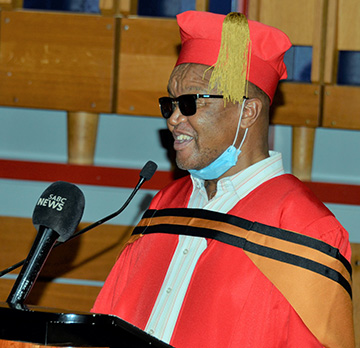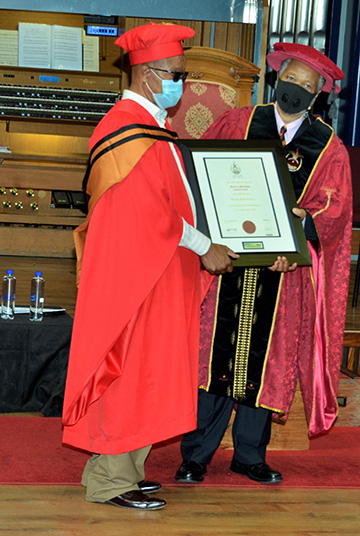News & Events
Visionary singer sees disability as a tool for self-reinvention

Legendary musician and advocate, Tebogo Steve Kekana, was awarded the degree of Doctor of Philosophy (honoris causa) by Unisa on 13 November 2020.
Legendary musician and advocate, Tebogo Steve Kekana, was awarded an honorary doctorate in philosophy by Unisa on 13 November 2020. He joined an esteemed line-up of honorary doctorate recipients—Moses Ngwenya, Hosi Lwandlamuni Nwamitwa II, and Dr Motsoko Pheko—on stage on the evening.
In accepting his honorary doctorate, Kekana commenced his address by saying: “I had a dream to obtain a degree from this university, but I did not fathom that it would come in this nature. I am humbled to be chosen to come and represent people living with disabilities. This will convey a strong message to the world that a disability is not a hindrance. Instead, a disability is a tool for self-reinvention and defiance to stereotypes, biases, and underestimation. Having a disability means taking space and contributing to the development of society.”
Citing from The I in me, his biography authored by Sydney Maluleke, a lecturer from the Department of English Studies in the College of Human Sciences at Unisa, Kekana said: “When I am asked why I do not see an optometrist so that my cornea could be fixed so I could regain my sight, my response is that I would hate to have sight without a vision. I would rather have vision without sight.”
Dreams come true
Reflecting on his academic journey, Kekana added that 28 years ago he enrolled for a degree in political studies at Unisa, but he had to de-register because of a tight schedule that came with his music career. Though he later obtained a law degree with the then University of Turfloop (the current University of Limpopo), Kekana said, “My thirst to be conferred a degree by Unisa would never be quenched. When I joined music, I never knew that it will lead me to the greatest university in Africa. I am inundated with joy today that finally my dream came true.”
Eight years ago, Kekana worked part-time as a lecturer in Unisa’s Department of Mercantile Law. His duties included tuition, academic citizenship, community engagement, and research. He also prepared study guides for courses in labour relations, employment equity, occupational health, and coordination of the marking process.

Prof Mandla Makhanya (Principal and VC, Unisa) (right) congratulates Steve Kekana on the degree of Doctor of Philosophy (honoris causa) conferred on him by the university.
“People who believed in me”
“When I became blind at the age of five, my poor mother was distraught as she had nothing within her power to help me. My grandfather said to her, ‘My child, worry not. This child will grow up and be the king of all his siblings.’ That prophecy has manifested itself in many ways. I became one of the best musicians, the first blind radio presenter, a lecturer, a lawyer, and the only child out of my siblings to attain education,” said Kekana, dedicating the degree to his late grandfather, Kgaka Kekana, who envisioned his life beyond blindness.
Surely, Kekana said, “it takes a village to raise a child,” thanking his late mother, Sophie Kekana, and Samuel Hlahla, who gave him admission at Siloe School for the Blind. Adding to the list, he mentioned the late Tom Vuma, a talent scout and his former producer, who discovered him in Driekop. He signed Kekana with his recording company, EMI. “Had it not been for Bro Tom, perhaps I would not be who I am today,” he said.
Furthermore, Kekana dedicated the degree to 17 slain avid supporters of his music from Maseru in Lesotho, who lost their lives in a disaster concert that took place at the AME Church Hall where he performed in August 1980. This degree was also dedicated to all his supporters across the globe, who gave him strength to keep on running and release more than 45 successful albums.
Ending his speech, Kekana expressed his joy to be honoured together with his long-time friend Black Moses Ngwenya. “Our friendship dates back to the late 70s when I started music. He and the Soul Brothers—David, Tuza, Zenzele, and American—were already making waves and they became my yardstick markers,” he enthused.
“Every time they released an album, I would listen to it with my backing band Pages, and we would try to find the gaps and see how we were going to do a counter-attack. As versatile talented musicians, you had to work hard to come second to them. For all this, I want to say, brother, we have run a good race and the journey is not yet over.”
In addition to collecting his degree, the 62-year-old brilliant singer and songwriter blessed the crowd with a performance of his hit song Iphupho, but remixed it for the occasion.
*By Lesego Ravhudzulo, Journalist, Department of Institutional Advancement
Publish date: 2020/11/18
